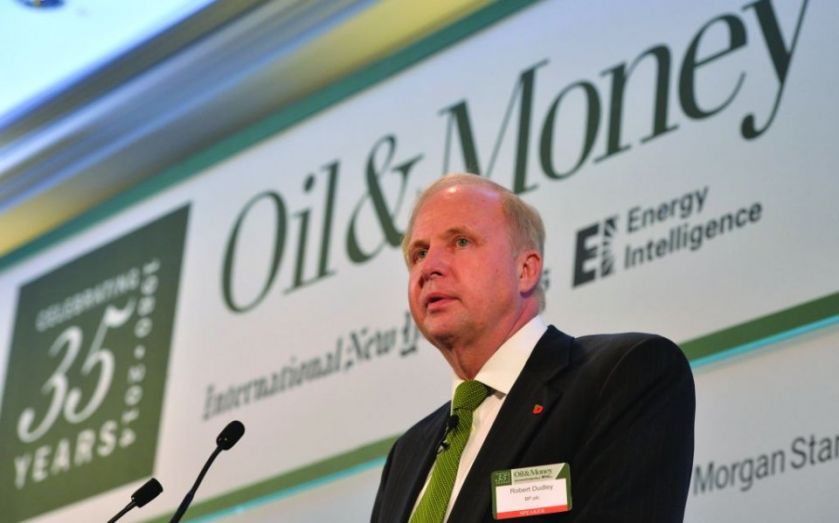Rocky market could prompt oil mega-mergers as price fall forces drastic decisions

After six months of falling oil prices, analysts have pointed to a possible mega-merger between the majors.
Chances of a shock deal have been heightened by firms slashing their spending in the face of oil prices that are expected to remain low for at least the next six months and possibly the next three years.
BP yesterday revealed that it has slashed its capital expenditure (capex) guidance for 2015 from between $24bn and $26bn to around $20bn. The firm is not alone in reducing capex – Shell, Chevron, CNOOC are just a few of its peers to have made similar moves – and Mike van Dulken, head of research at Accendo Markets, commented: “More capex cuts in the industry highlight the long-term impact of the recent declines in the oil price with much investment taking time before bearing fruit.”
He also noted that taking this action and restricting supply in the near-term future may help the oil price to recover.
However, others warned that this is not necessarily unqualified good news. Malcolm Graham-Wood, analyst at HydroCarbon Capital, said that the more that the big companies decided to cut capex the sharper the “bounce” in the oil price will be when it happens, with firms scrambling to up their production as quickly as possible.
And Graham-Wood pointed to another consequence of capex reduction specific to BP. “By reducing capex – it means they are downsizing the company,” he stated. “If you look at the cashflow, inflow is reduced dramatically because of oil price but outgoings are huge because of the dividend.”
BP chief executive Bob Dudley said yesterday that increasing value for shareholders remains the company’s “first priority”, despite also conceding that 2015 represents a “raging gale” in terms of the oil market. He also predicted that the market is facing “probably several years of lower prices”.
Kim Fustier at Edison Investment Research, told City A.M. BP should never have made a commitment to increasing the dividend. “It’s not prudent,” she said. “And I think the market will crucify them if they start cutting it.”
Worse than the reputational damage the company could face though is the fact that being tied in to an ever-growing payout to shareholders has the potential to leave BP open to attack. “BP is extremely vulnerable and could be bought tomorrow,” cautioned Graham-Wood, who continued: “And it would be a good deal for whoever got them.”
There are just two issues that would stand in the way of such a deal – BP’s involvement with Russian-owned Rosneft, and its ongoing legal wrangles in the US over the 2010 Gulf of Mexico spill. However, Graham-Wood maintained: “I think Exxon would buy if they cut a deal on the courtroom steps.”
Fustier disagreed that 2015 would see BP become a target for buying. While she acknowledged that Shell’s chief executive Ben van Beurden said he would be very opportunistic as a consolidator of companies with weaker capitalisation, she stated that this should be read as a reference to buying up assets as opposed to a mega-merger.
But whether or not a deal does take place in the next 12 months, the current oil market has, as Graham-Wood put it, “sorted the men from the boys”. He advised: “If you want solid stable dividend increases you have to go with Shell or Exxon – if you want to play the roulette wheel it’s BP.”
OIL COLLAPSE : LATEST DEVELOPMENTS
BP
Posted underlying profit of $2.2bn (£1.45bn) for the last quarter of 2014, down from $2.8bn in the same period of 2013.
Reduced capex for 2015 from $24bn-$26bn to $20bn due to “likelihood of oil prices remaining low”.
GAZPROM
The Russian company’s third quarter profit fell 60 per cent to 105.7bn roubles (£1.06bn), down from 276bn roubles in 2013.
Stated that further falls in oil would have a negative affect on the business and its ability to finance planned capital investments.
CNOOOC
Chinese state-owned firm is cutting capex by up to 35 per cent, but still plans to grow production by 15 per cent.
Shares in CNOOC, which is first Chinese firm to address low oil price, have lost more than a fifth of their value over past six months.
BG GROUP
Wrote off impairment charge of $6bn in last quarter of 2014, and posted a loss of $1.4bn for the full year, down from £2.5bn profit.
Expects 2015 capex to be “significantly lower” than 2014 capex of $9.4bn. Projected spending set at $6bn – $7bn.